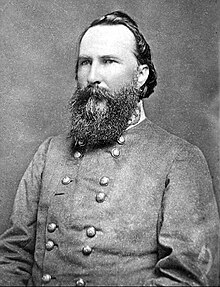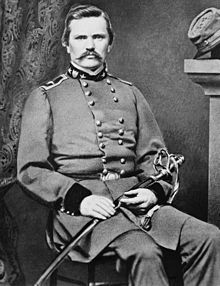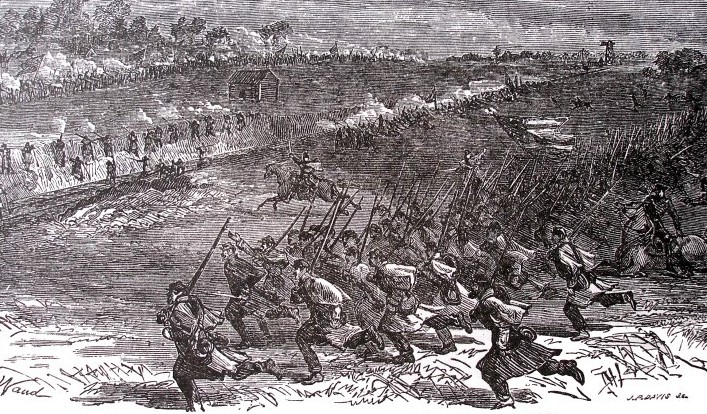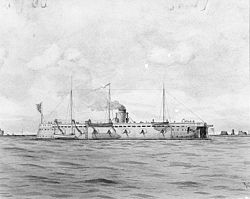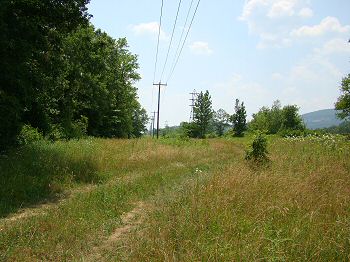 |
| Wauhatchie Battlefield, Rowden Cabin Site (CivilWarAlbum.com) |
HEADQUARTERS ELEVENTH AND TWELFTH CORPS,
Lookout Valley, Tennessee,
October 29, 1863-1 a.m.
Major-General REYNOLDS,
Chief of Staff, Chattanooga:
Major-General Hooker directs me to inform the major-general commanding
that he has moved all his force to the assistance of General Geary, at
Wauhatchie. No report has been received from General Geary, but heavy
firing in that direction indicates that he has been attacked.
Very respectfully,
DANL. BUTTERFIELD,
Major-General, Chief of Staff.
OCTOBER 29, 1863-1.15 a.m.
General THOMAS:
Heavy fire raging between this and Wauhatchie.
WHITAKER,
Brigadier-General.
OCTOBER 29, 1863-1.45 a.m.
General TURCHIN:
Leave one regiment of your eight regiments in position and move the rest
of the regiments down to the gorge, and go down there in person and take command of all the troops there. I will be at General
Hazen's headquarters. You can communicate with me by signal from this
[point] or by sending up the mountain.
W. F. SMITH,
Brigadier-General.
OCTOBER 29, 1863-2.20 a.m.
General THOMAS:
A brisk engagement has been and is now going on in the vicinity of
Wauhatchie, and General Hooker has moved part of his force down.
W. B. HAZEN,
Brigadier-General.
OCTOBER 29, 1863-2.30 a.m.
General THOMAS:
Fight still raging furiously. Think we are being driven a little.
W. C. WHITAKER,
Brigadier-General.
HEADQUARTERS ELEVENTH AND TWELFTH CORPS,
Lookout Valley,
October 29, 1863-3 a.m.
General WHITAKER and Colonel MITCHELL,
Commanding Officers of Brigades, near Brown's Ferry Bridge:
Major-General Hooker directs me to say that, in accordance with
instructions received from Major- General Thomas, you would be ready to
move to his support. He desires that you commands move up and report to
him.
Very respectfully,
DANL. BUTTERFIELD,
Major-General, Chief of Staff.
HEADQUARTERS ELEVENTH AND TWELFTH CORPS,
Lookout Valley, Tennessee,
October 29, 1863-3 a.m.
Major-General REYNOLDS,
Chief of Staff, Chattanooga:
General Hooker directs me to say that he has called up the brigades of
General Whitaker and Colonel Mitchell; that the enemy has been foiled in
his attempt thus far to break the line. We have prisoners from two
brigades of Longstreet's corps. They state that two prisoners, or all of
Longstreet's corps that are here, have crossed, their aim being to
prevent the opening of this line. Reports come in of sounds and commands
as if massing and forming troops. The general anticipates from this and
what the prisoners say a renewal of enemy's attack at daylight. He
would like to have signal officers sent out.
Very respectfully,
DANL. BUTTERFIELD,
Major-General, Chief of Staff.
OCTOBER 29, 1863-3 a.m.
General TURCHIN:
You need not remove that regiment if you have not already done so.
W. F. SMITH,
Brigadier-General.
OCTOBER 29, 1863-3.30 a.m.
Colonel MITCHELL,
At General Whitaker's:
You will hold your command in readiness to proceed at a moment's notice to the support of General Hooker.
THOMAS,
General.
OCTOBER 29, 1863-3.30 a.m.
General WHITAKER:
The general commanding directs that you move to Brown's Ferry with your
command, except your battery and proper support for it. Send this order
also to Colonel Mitchell. Obey a call from General Hooker if one should
come for aid.
J. J. REYNOLDS,
Major-General.
DEPARTMENT HEADQUARTERS,
October 29, 1863-3.50 a.m.
General WHITAKER:
Send a staff officer to Brown's Ferry to ascertain if you are needed, and if so move down at once.
By order of Maj. General George H. Thomas:
J. J. REYNOLDS,
Major-General.
OCTOBER 29, 1863-4 a.m.
General THOMAS:
Fight abated. From sound enemy appear to hold Kelley's Gap, our troops
having been apparently driven toward Wauhatchie. They have made an
assault in direction of Smith's left, and have been repulsed. Do not
know the troops. Judge from the sound.
W. C. WHITAKER,
Brigadier-General.
HEADQUARTERS ELEVENTH AND TWELFTH CORPS,
Lookout Valley, Tennessee,
October 29, 1863-4 a.m.
Brigadier-General GEARY,
Commanding Division:
General Hooker directs me to say that if you hear firing or fighting on
your left, it will probably be General Schurz pushing out to join you.
If you have to change position from the developments
before or after daylight, aim to fight in this direction, but bear in
mind if it should be necessary, which is not anticipated, that you have a
line open via Kelley's Ferry to Brown's Ferry Bridge and Chattanooga.
Schurz should be up with you by the time this reaches you.
Very respectfully,
DANL. BUTTERFIELD,
Major-General, Chief of Staff.
OCTOBER 29, 1863-4.20 a.m.
General WHITAKER:
Send a staff officer to Brown's Ferry to ascertain if you are needed, and if so move down at once.
J. J. REYNOLDS,
Major-General.
HEADQUARTERS ELEVENTH AND TWELFTH CORPS,
Lookout Valley, Tennessee,
October 29, 1863-6.45 a.m.
Major-General REYNOLDS,
Chief of Staff, Chattanooga:
General Hooker directs me to say that the brigades of General Whitaker
and Colonel Mitchell, ordered up at 3 a.m., have not yet reported.
Very respectfully,
DANL. BUTTERFIELD,
Major-General, Chief of Staff.
HDQRS. SECOND DIVISION, TWELFTH ARMY CORPS,
Rowden's House,
October 29, 1863-7 a.m.
Maj. General D. BUTTERFIELD,
Chief of Staff, Eleventh and Twelfth Army Corps:
GENERAL: My command is almost without ammunition. Please have some sent
me, say 70,000 rounds. One brigade of General Schurz' has reported to me
and been placed in position; the balance of his division is located in
the mountain, and, I believe, is going to remain there.
I have the honor to be, general, very respectfully, your obedient servant,
JNumbers W. GEARY,
Brigadier-General, U. S. Volunteers, Commanding.
HEADQUARTERS ELEVENTH AND TWELFTH CORPS,
Lookout Valley, Tennessee,
October 29, 1863-7.10 a.m.
Brigadier-General GEARY:
Yours of 7 a.m. received. Another brigade of General Schurz' has been
sent you. With these you can relieve some of your regiments
that are exhausted and out of ammunition. Also another brigade from
Chattanooga. What ammunition we have has been sent forward, and is by
this time up to the mountains where General Tyndale's brigade is posted,
where you can get it. When all these troops arrive detach a regiment to
go and escort up the supply train 3 miles back toward Whiteside's. Is
your rear toward Whiteside's open? Can you send down in Lookout Creek
Valley and find out anything for us concerning the enemy, with scouts or
otherwise?
Very respectfully,
DANL. BUTTERFIELD,
Major-General, Chief of Staff.
HEADQUARTERS ELEVENTH AND TWELFTH CORPS,
Lookout Valley, Tennessee,
October 29, 1863-7.45 a.m.
Major-General REYNOLDS,
Chief of Staff, Chattanooga:
The position now held and being intrenched by General Geary this side of
Wauhatchie, at the forks of Kelley's Ferry and Chattanooga roads,
should have the supervision of a competent engineer to locate lines and
works in the most advantageous manner; the position is a very important
one. I have no engineer officer in the command. I have to request that
one may be sent out here at once.
Very respectfully,
JOSEPH HOOKER,
Major-General, Commanding.
HEADQUARTERS ELEVENTH AND TWELFTH CORPS,
Lookout Valley, Tennessee,
October 29, 1863-8.20 a.m.
Major-General REYNOLDS,
Chief of Staff, Chattanooga:
General Schurz reports large columns of the enemy seen to march down
along Lookout Creek, and then, turning to the right, marching up the
mountain. Is it not possible to injure them from the Moccasin Point or
other batteries on the north side of the river? The prisoners captured
last night on the ridge carried by Smith's brigade are sent in herewith.
Very respectfully,
JOSEPH HOOKER,
Major-General, Commanding.
HEADQUARTERS,
October 29, 1863-11 a.m.
General WHITAKER:
Report any change of pickets on Lookout Mountain.
J. J. REYNOLDS,
Major-General.
HDQRS. SECOND DIVISION, TWELFTH ARMY CORPS,
Rowden's House,
October 29, 1863-3.30 p.m.
Commanding Officer Advance Forces:
SIR: Bring your command to this point as rapidly as possible. We need
re-enforcements. Guard well your right flank. Rowden's house is at the
intersection of the Chattanooga and Brown's Ferry by the Kelley's Ferry
road.
By command of Brig. General John W. Geary:
THOS. H. ELLIOTT,
Captain, Assistant Adjutant-General.
OCTOBER 29, 1863-5 p.m.
General REYNOLDS:
See no change on the enemy's front or picket lines. As many are visible
now as this time last evening. I have sent for the Ninety-night Ohio
from the island to strengthen my pickets. Shall I stay here or go to the
regiments re-enforcing General Hooker?
W. C. WHITAKER,
Brigadier-General.
OCTOBER 29, 1863-7.05 p.m.
General WHITAKER:
You can remain at your headquarters to-night, but be prepared to cross the river in case of an attack.
THOMAS,
General.
HEADQUARTERS SIGNAL CORPS,
October 29, 1863.
Maj. General J. J. REYNOLDS:
GENERAL: The officer on signal station opposite Lookout, at Fort Whitaker, reports the following:
Heavy columns of rebel troops have been passing across Chattanooga
Valley from right (our right) to left. Were seen to pass front of
General Baird's division. They occupied half an hour in passing
one point. He estimate the number at about that of a division. No
artillery with them. Battery No. 5 opened upon them. Could see them as
they passed the different openings until they entered the woods at a
point he judges to be opposite General Rousseau's command. This was at
about 12 m.
Respectfully,
W. E. SHERIDAN,
Captain, and Acting Signal Officer.
OCTOBER 29, 1863-7.50 p.m.
General THOMAS:
Rebel troops were moving about northeast. They were twenty-seven minutes in passing a given point.
WOOD,
Lieutenant, and Acting Signal Officer.
Official Records, Series I., Vol. 31, Part 1, Pages 59-67.
This extensive selection of battle communications is noteworthy for many reasons, not the least of which it describes one of the few intense night combats of the war, the Battle of Wauhatchie. After Hazen had established a bridgehead at Brown's Ferry, Bragg ordered Longstreet to attack. Longstreet ordered a night assault on Geary's force. The attack started at midnight, two hours late, but even though the Union forces were on the alert they were surprised by the intensity of the attack. Hooker ordered Schurz to reinforce Geary and Steinwehr also was sent in, arriving before Schurz. His men attacked a 200 foot hill held by Evander Law's Confederates, which dominated Brown's Ferry. Several Union assaults were repulsed, but Law received erroneous reports of Union success and pulled back. Just as the Confederates began to gain the upper hand, with Geary's men running low on ammunition, reports of Union reenforcements in the rear of the Confederate force caused a withdrawal. Union casualities were 216 and Confederate 356. This was the first battle in the series of battles which became the Battle of Chattanooga.

